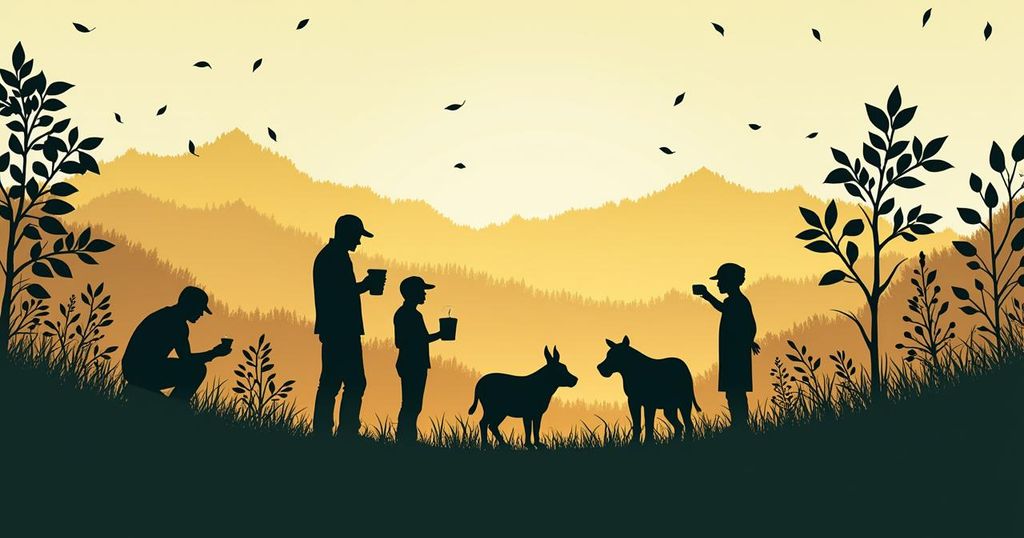Starbucks Takes Steps to Climate-Proof Coffee Supply with New Investments in Central America
Starbucks is investing in two new coffee farms in Central America to counter the impacts of climate change on its coffee supply. The company’s efforts are directed toward studying hybrid coffee varieties and improving soil productivity, while also addressing labor shortages through technology. This strategic move is part of a broader commitment to sustain its coffee sourcing amid increasing weather-related challenges.
Starbucks has announced its investment in two new coffee farms located in Central America, aiming to mitigate the impact of climate change on its coffee supply chain. The Seattle-based company sources approximately 3% of the entire global coffee supply, which has been increasingly vulnerable due to adverse weather conditions, including rising temperatures and extreme frost events like those experienced in Brazil. The newly acquired farms in Costa Rica and Guatemala will serve as innovation centers where Starbucks will investigate how its hybrid coffee varieties adapt to varying elevations and soil types. This strategic approach follows the company’s previous investment in a Costa Rican farm over a decade ago. With climate-induced disruptions worsening—evidenced by recent projections indicating frost-related volume losses of up to 50%—Starbucks is making a concerted effort to safeguard its Arabica bean supply and stabilize coffee prices for consumers, which have surged by 18% in the past five years, as reported by the Bureau of Labor Statistics. Roberto Vega, Starbucks’ Vice President of Global Coffee Agronomy, Research and Development, and Sustainability, emphasized the necessity of this initiative: “Frosts in Brazil have already impacted volumes of up to 50%, so we can have really severe impact in terms of product availability, and that is more and more regular in the whole Coffee Belt.” The Coffee Belt, characterized by prime coffee-growing conditions, presents both opportunities and challenges for Starbucks as it seeks to enhance the productivity of its coffee farms. The firm’s research at the new farms will focus on developing hybrid plants that reflect resilience to diseases such as coffee leaf rust, which thrives in warmer and wetter climates. Vega noted, “We can develop new hybrids, but the fact that a hybrid works in one country and under certain conditions doesn’t mean that it’s going to be working everywhere.” Additionally, the Guatemalan farm, considered small and previously neglected, will provide a case study for rejuvenating degraded soil and increasing overall productivity—an approach Starbucks intends to replicate and share with other farmers facing similar adversities. Vega stated, “The farm is not necessarily in good shape, and that’s exactly what we were looking for. We wanted a farm that really mirrors the challenges that farmers are having today.” At the Costa Rican farm, which adjoins the company’s existing property, Hacienda Alsacia, Starbucks plans to employ advanced technologies, including drones and mechanization, to combat labor shortages prevalent among Latin American coffee producers. Looking ahead, the company also intends to expand its agricultural portfolio further by acquiring two more farms in Africa and Asia, thereby reinforcing its commitment to sustainable coffee sourcing across the Coffee Belt.
The context surrounding Starbucks’ investment in two new coffee farms lies in the ongoing challenges posed by climate change to the coffee industry. Coffee production is highly susceptible to minimal temperature changes and extreme weather patterns, which threaten the availability of coffee beans, particularly Arabica beans. This necessity for adaptation has prompted Starbucks to explore innovative agricultural strategies through its investments in research and development at these farms. Furthermore, these efforts will contribute to Starbucks’ long-term sustainability goals, addressing not only climate resilience but also operational viability in coffee farming.
In conclusion, Starbucks’ investment in new farms reflects a proactive approach to safeguarding its coffee supply against the adverse effects of climate change. By researching hybrid coffee varieties and employing advanced agricultural techniques, the company aims to enhance resilience among its coffee producers. Addressing both immediate challenges and long-term sustainability goals will be crucial for maintaining the availability of quality coffee for consumers globally.
Original Source: www.cnbc.com




Post Comment